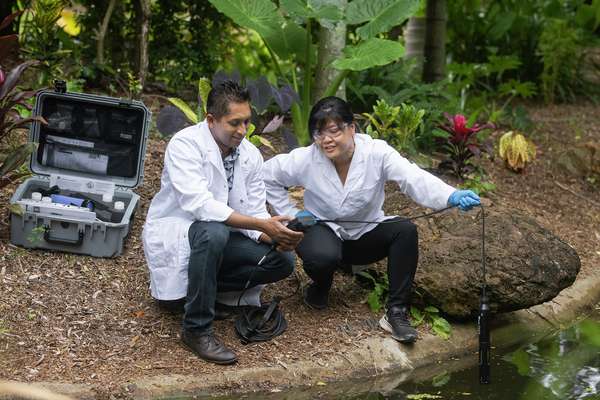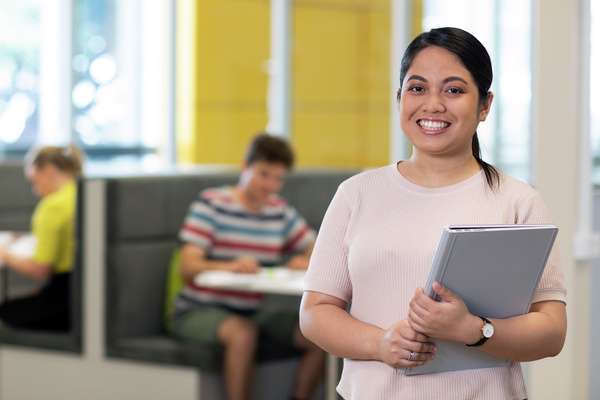Find out more about the THE Impact Rankings
We actively participate in, coordinate and lead a range of initiatives and activities that align to the United Nations' Sustainable Development Goal (SDG) 10 Reduced Inequalities.
We are proud to have the highest ratio of students from low socio-economic, mature age, Aboriginal and Torres Strait Islander, and first-in-family backgrounds. The University defines itself by who it embraces rather than who it excludes, and because of this is widely recognised as Australia's most inclusive university. We are focused on creating and build stronger relationships and sustainable opportunities that will enable equality and integration, greater study, employment and research prospects and the reciprocation of knowledge.
Our Indigenous Engagement Division (IED) plays a pivotal role at the University in providing leadership to improve higher education outcomes for Indigenous Australians. The office drives informed policy development to influence the way in which the University provides higher education, training, research opportunities and engagement that expresses a deliberate destiny for Aboriginal and Torres Strait Islander people.
The Indigenous Student Advising Specialists within the Student Service SPOT provides advice about a number of support services available to Aboriginal and/or Torres Strait Islander students including:
Student Support Services are available for all students including those from underrepresented groups such as Aboriginal and/or Torres Strait Island students, international students, and students with disabilities.
Services include:
We have dedicated employees available to assist with any equity or diversity requirement including our Equity Program Officers and Student Access and Equity Manager. To reach out to the Program Officers, contact the Equity and Diversity Office.
We developed an online micro-credential which explores what it means to work in a diverse workplace and introduces the roles of leadership, valuing individual and group differences and promoting a culturally diverse and harmonious workplace.
Our Student Mentors are existing students who volunteer their time to help new and continuing students transition to life and study at university.
We are dedicated to creating a safe and supportive atmosphere for all students with a zero-tolerance approach to bullying and discrimination. As part of this, we have implemented an Ally Program to promote acceptance and understanding for lesbian, gay, bisexual, transgender, intersex, and queer (LGBTIQ) students.
There is an Ally Network on Moodle as a connection point for any student who would like to be involved, with resources, links, and forums. It is a place for students to access support and get in contact with an Ally.
There are a number of scholarships available for students with disabilities and/or students from underrepresented groups. A sample of the scholarships available are shown below or for more information on available scholarships visit our scholarships page which includes both our University and external stakeholder scholarships.
We deliver educational outreach programs and activities such as lectures, demonstrations, presentations and displays. Many of these activities are driven by our staff, and as a student, you may be involved in voluntary student-run initiatives during your time with us.
Explore the sample of the outreach activities undertaken in 2024 below:
General
STEM
Arts
Agriculture
Studying abroad for a year, term, or even just a couple of weeks is a very rewarding and educational experience. Students have opportunities to travel, make friends from around the world, enhance employment prospects, and possibly even learn another language. Above all, they will gain a fresh perspective on the world around them. We are all part of an increasingly globalised world and international study gives students a cultural awareness and life experience that will set them apart from their peers. Read more about these experiences from 2024:
You can find out more on our CQUGlobal Outbound page.
Some of the recent news stories that align with SDG10 Reduced Inequalities:
Bundaberg, QLD residents living with a disability will be able to access local beaches and enhance their lives through movement thanks to the Universal Beach Access Hub (U-Beach). U-Beach is a project driven by our university, in collaboration with Bundaberg Regional Council, Surf Lifesaving Queensland, Community Lifestyle Support, and Rotary Bundaberg Region, as well as local education providers and sporting clubs.
Led by Lecturer in Neurological Physiotherapy Dr Vanesa Bochkezanian, the Electrical Stimulation (E-Stim) treatment aims to increase muscle mass, reduce spasticity and improve overall physical health. The project uses electrical stimulation to improve the lives of those living with spinal cord injuries.
Our vision for reconciliation remains a more just and equitable Australia achieved through the self-determination of Aboriginal and Torres Strait Islander peoples, supported by a tertiary education sector that truly embraces their knowledges, leadership and strengths.
We continue to work towards achieving this vision of reconciliation – by not only incorporating and normalising Aboriginal and Torres Strait Islander cultures and perspectives within our everyday business, but also by promoting First Nations voices and contributions across our partners and stakeholders, and our wider communities. The Stretch Reconciliation Action Plan is an important step in meeting our vision.
We are proud to be Australia’s most engaged university and to support the development of global sustainability.

Explore where our students have been volunteering and contributing to projects.

University policies that govern and guide our commitment.
CQUniversity Australia is a trading name of Central Queensland University
ABN: 39 181 103 288
RTO Code: 40939
CRICOS: 00219C
TEQSA: PRV12073